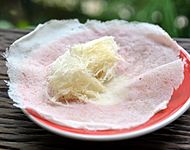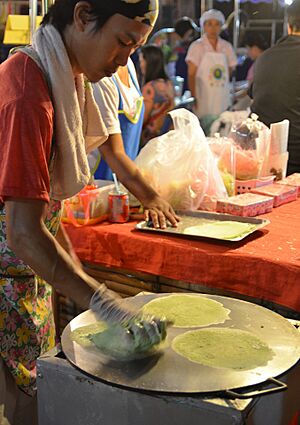Roti sai mai facts for kids

Roti sai mai on a plate in Chiang Mai, Thailand
|
|
| Course | Dessert |
|---|---|
| Place of origin | Thailand |
| Region or state | Southeast Asia |
Roti sai mai (Thai: โรตีสายไหม, pronounced [rōːtīː sǎːj mǎj]) is a super yummy and colorful dessert from Thailand. It's often called "Ayutthaya's cotton candy" because it's very popular in the city of Ayutthaya. Imagine soft, sweet cotton candy wrapped inside a thin, pancake-like bread called roti. It's a special treat you can find at street stalls all over Thailand, often sold by Muslim vendors.
Contents
What is Roti Sai Mai?
Roti sai mai is a delicious dessert that brings together two different sweet treats. It combines a thin, flatbread called roti with a type of spun sugar, much like cotton candy. The name "sai mai" actually means "silk rope" because the spun sugar looks like thin, silky threads.
The Sweet Cotton Candy
The "sai mai" part of the dessert is made from spun sugar. This sugar is heated and then pulled into very fine, thin threads. These threads are often colorful, like pink, green, or blue. They are super sweet and melt in your mouth, just like regular cotton candy.
The Thin Roti Wrap
The "roti" part is a very thin, soft pancake or flatbread. It's usually made from flour and can be white or sometimes green. The green color comes from natural ingredients like pandan leaves, which also give it a nice smell. Sometimes, a sprinkle of sesame seeds is added to the roti for extra flavor.
How Roti Sai Mai is Made
Making roti sai mai is a fun process to watch! First, the thin roti sheets are quickly cooked. Then, a handful of the colorful, silky spun sugar is placed on top of a roti. You then roll the roti around the sweet threads, creating a tasty, portable dessert. It's a bit like making a sweet taco or a mini burrito!
History of Roti Sai Mai
The city of Ayutthaya has always been a place where different cultures met and shared ideas. This is how Roti Sai Mai became one of its most famous treats.
Islamic Influence
The idea for Roti Sai Mai came to Ayutthaya from Muslim traders. They brought the recipe for roti, which is a type of bread from the Indian subcontinent. Over time, people in Thailand adapted this roti to create a new dessert by adding the local spun sugar.
Becoming Popular
Muslim traders were important in making this sweet treat well-known. They started making and selling Roti Sai Mai in large amounts. Soon, it became very popular with everyone in the community, and it's still loved today.
Where to Find Roti Sai Mai
You can find this tasty dessert at many roadside stalls in both cities and the countryside across Thailand. It's a common street food. One of the best places to find Roti Sai Mai is often near busy areas, like in front of the Ayutthaya Hospital, where many vendors set up their booths.
 | Jewel Prestage |
 | Ella Baker |
 | Fannie Lou Hamer |


